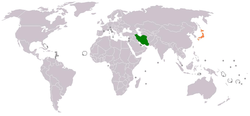Iran–Japan relations
Iran–Japan relations (Persian: روابط ایران و ژاپن, Japanese: 日本とイランの関係) are diplomatic relations between Iran and Japan, which were formally established in August 1929.[1] Throughout history, except during World War II, both of the countries have maintained a relatively friendly and strongly strategic partnership.
 | |
Iran |
Japan |
|---|---|
According to a 2012 BBC World Service poll, only 4% of Japanese people view Iran's influence positively, with 52% expressing a negative view.[2] According to a 2012 Pew Global Attitudes Survey, 15% of Japanese people viewed Iran favorably, compared to 76% which viewed it unfavorably; 94% of Japanese people oppose Iranian acquisition of nuclear weapons and 61% approve of "tougher sanctions" on Iran. Notably, only 40% support use of military force to prevent Iran from developing nuclear weapons, with 49% of Japanese accepting a nuclear-armed Iran, a higher percentage than any other surveyed country, including China, Russia and any Muslim nation.[3]
Japanese Prime Minister Shinzo Abe visited Iran in June 2019 to try to mediate between the U.S. and the Middle Eastern nation.[4]
According to the New York Times, in an attempt to find a solution to Iran’s stalemate situation with U.S, Iran has proposed President Rouhani visit Japan as reported by kyodo news agency. [5]
History
Present-day Iran and Japan were known to have had direct trade links since at least the 7th century, but new testing on a piece of wood—first discovered in the 1960s—suggests broader ties, Japanese researchers said. Infrared imaging revealed previously unreadable characters on the wood—a standard writing surface in Japan before paper—that named a Persian official living in the country.[6] Strong cultural influence from Persian exist in Japan as well as in Korea.[7][8][9]
In 1878, the Japanese ambassador to Russia, Enomoto Takeaki, was received in a formal audience in Saint Petersburg by Persian King Nasser al-Din Shah Qajar. However, formal diplomatic relations were not established until 1929. A Treaty of Amity was signed between Iran and Japan in 1939, and cordial relations were maintained during World War II until 1942, when the Allies invaded Persia. Formal diplomatic relations were restored in 1953 after the signing of the Treaty of San Francisco.[10]
Iran and Japan signed a visa-free travel arrangement in 1974, but it was terminated in April 1992 due to large-scale illegal Iranian migration to Japan, following the Iranian Revolution aftermath.[11] Iran and Japan also cooperate on regional foreign policy issues in the Middle East, such as the reconstruction of Afghanistan and the Israeli–Palestinian conflict.[12] Since 2004, Japan has been working on developing Iran's largest on-shore oil field, located at Azadegan.[13]
Iranian president Seyyed Mohammad Khatami made a state visit to Japan in October 2000. The year 2019, marks the 90th anniversary of Iran and Japan’s diplomatic relationship according to BBC. [14]
Trade relations
Japan's foreign policy towards and investments in Iran have historically been dominated by the desire to secure reliable energy supplies; Iran is Japan's third-largest oil supplier after Saudi Arabia and the United Arab Emirates.[15] Before 2012, Iran has been providing Japan as a major supplier of its crude oil of about 10 to 15%. [16]
The balance of trade between Iran and Japan is heavily weighed in favor of Iran, with Japan exporting automobiles and electrical products and importing petroleum and petrochemical products. As of 2010, Japan cooperates with Iran on several major projects; the annual trade volume of the two states exceeds $11 billion.[17]
External links
References
- "Japan-Iran relations". Ministry of Foreign Affairs, Japan. July 2007. Retrieved 2007-08-07.
- Opinion of Iran BBC
- A Global “No” To a Nuclear-Armed Iran Pew Research Center
- Vahdat, Amir; Batrawy, Aya; Gambrell, Jon (12 June 2019). "Japan premier warns US, Iran 'accidental conflict' possible". AP NEWS. Retrieved 13 June 2019.
- "Iran Proposes Rouhani's Visit to Japan Amid Nuclear Impasse: Kyodo".
- "Research uncovers evidence that ancient Japan was 'more cosmopolitan' than previously thought". The Japan Times Online. 2016-10-05. ISSN 0447-5763. Retrieved 2016-11-16.
- Sarah M. Nelson, (1993, pp. 243–258)
- ""Paji"; Persian influence in ancient Japan?; CM of the week: Nissin Foods | The Japan Times". The Japan Times. Retrieved 2017-09-12.
- "New Discovery About Persians in Ancient Japan Generates Excitement". 2016-10-10. Retrieved 2017-09-12.
- Kodansha Encyclopedia of Japan, pp. 623
- "Chapter III, Section 6: The Middle East". Diplomatic Bluebook: Japan's Diplomatic Activities. Ministry of Foreign Affairs, Japan. 1992. Archived from the original on 2007-09-28. Retrieved 2007-08-07.
- "Iran, Japan Ready to Cooperate in Afghan, Palestinian Issues". People's Daily. 2002-05-05. Retrieved 2007-08-07.
- "Japan ready for talks with Iran on lucrative Azadegan oil venture". Islamic Republic News Agency. 2006-09-15. Archived from the original on 2007-09-30. Retrieved 7 August 2007.
- "Japan's Shinzo Abe in Tehran for talks amid US-Iran tensions".
- "Japan Strives to Balance Energy Needs with World Politics". Wharton School of Business, University of Pennsylvania. 2006-11-26. Retrieved 2007-08-08.
- "Explainer: Why is Japan's Abe going to Iran? What can he accomplish?".
- http://www.presstv.com/detail.aspx?id=119540§ionid=351020104 Press TV

